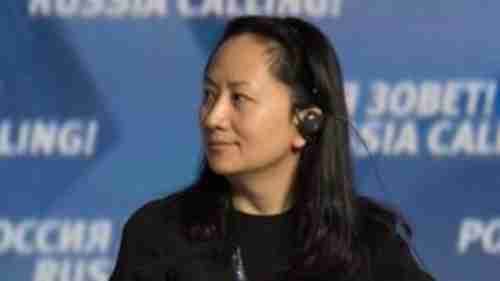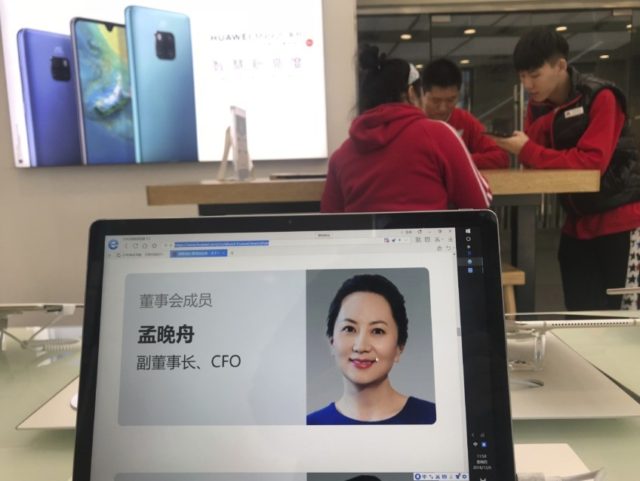This morning’s key headlines from GenerationalDynamics.com
- Canada arrests the chief financial officer of China powerhouse Huawei
- China reacts with fury at the arrest of Meng
- English-speaking ‘Five Eyes’ countries are banning Huawei products
Canada arrests the chief financial officer of China powerhouse Huawei

Meng Wanzhou
At the request of the United States, Canadian police arrested Ms. Meng Wanzhou (Sabrina Meng), the chief financial officer (CFO) China’s telecom powerhouse Huawei Technologies, founded by her father Ren Zhengfei. Before founding Huawei, Ren was an officer and engineer in China’s People’s Liberation Army (PLA).
According to the US Justice Department: “She is sought for extradition by the United States, and a bail hearing has been set for Friday. As there is a publication ban in effect, we cannot provide any further detail at this time. The ban was sought by Ms. Meng.”
Reports indicate that Huawei is alleged to have used the global banking system to evade U.S. sanctions against Iran. In particular, it is believed that Huawei used HSBC Holdings Plc to conduct illegal transactions involving Iran. As CFO, Meng would be intimately familiar with any such illegal transactions.
HSBC Bank plc is a London-based international banking and financial services company. In 2012, HSBC paid a $1.92 billion fine for violating U.S. sanctions and money-laundering laws. HSBC is apparently not under investigation in the Huawei allegations.
Meng was arrested on Saturday in Vancouver airport, as she was changing planes. The arrest occurred at the same time that President Donald Trump and China’s communist leader Xi Jinping were having a dinner meeting that led to an agreement for a 90-day “ceasefire” in the “trade war” between the two countries.
Since the arrest occurred shortly before the dinner meeting, there is speculation that Trump timed the arrest to send a message to China and to Xi. However, the dinner meeting was planned well in advance of the arrest, and there would have been no way of predicting that Meng would be changing planes in Vancouver at exactly that time. National Security Advisor John Bolton says that he knew before the dinner that Meng was being arrested, but said that he did not brief Trump. Meng may have been put onto a list of people subject to arrest at Canadian airports months ago, but the fact that she happened to change planes in Vancouver on Saturday appears to be purely happenstance.
ZTE is another Chinese company that has been severely sanctioned for making illegal sales to Iran. The Trump administration heavily sanctioned ZTE, to the extent that ZTE would have gone out of business, costing hundreds of thousands of jobs in China, but Trump relented after a personal plea from Xi.
Mainstream media and other politicians are almost universally baffled by Trump’s foreign policy actions. But the policies all make complete sense when you understand that Trump believes (correctly) that the U.S. and China are headed for a world war, and he is adopting policies that he believes will prevent that outcome, even though Generational Dynamics predicts that a world war will happen with 100 percent certainty, no matter what Trump does.
In the case of the “trade war” policy, Trump has described its purpose as saving American jobs, which is true, but it also has the purpose of throwing China off its game of relentless militarization and preparation for war. However, it is an extremely risky policy because it may actually trigger war if the Chinese panic. The 90-day freeze gives the Chinese some breathing room and keeps them from panicking.
For that reason, the happenstance arrest of Meng is actually a risk to the ceasefire, since it could infuriate the Chinese to the point of triggering an unwanted reaction, including the arrest of American executives in China. It is possible that the Trump administration will decide to de-escalate this situation quickly by returning Meng to China as soon as possible. Globe and Mail (Toronto) and Reuters and Wired
China reacts with fury at the arrest of Meng
China’s foreign ministry has demanded the Canadians and Americans “immediately clarify the reason for the detention and release the detainee, and earnestly protect the legal and legitimate rights and interests of the person involved.”
China’s embassy in Canada posted the following:
At the request of the US side, the Canadian side arrested a Chinese citizen not violating any American or Canadian law. The Chinese side firmly opposes and strongly protests over such kind of actions which seriously harmed the human rights of the victim. The Chinese side has lodged stern representations with the US and Canadian side, and urged them to immediately correct the wrongdoing and restore the personal freedom of Ms. Meng Wanzhou. We will closely follow the development of the issue and take all measures to resolutely protect the legitimate rights and interests of Chinese citizens.
My guess is that Ms. Meng is being held in the equivalent of a suite in a five-star hotel. On the other hand, China is a country that kidnaps children, harvests the organs of political prisoners, and has a million ethnic Uighurs locked up in forced re-education prisons, where they can be tortured, raped, and killed for saying the wrong thing. I doubt that Ms. Meng is in danger of suffering any of those “human rights” violations. China Foreign Ministry and China’s Canadian Embassy
English-speaking ‘Five Eyes’ countries are banning Huawei products
Huawei Technologies is the world’s largest telecommunications equipment provider and it is the second largest mobile phone manufacturer. It is a pillar of the Chinese economy. Its founder Ren Zhengfei is a former military officer in the People Liberation Army (PLA). Meng Wanzhou is his daughter.
Huawei has been promoting itself worldwide to sell routers and other equipment for the latest technology advance, 5G networks, in countries around the world. Back in August, Australia banned Huawei from supplying equipment for its 5G networks. The United States has done the same, and last week New Zealand did the same.
The United States, Britain, Canada, Australia, and New Zealand are members of the “Five Eyes” alliance that shares intelligence to combat espionage, terrorism and global crime. Three of these countries have banned Huawei because of a security threat.
I have spent a part of my career as a senior software engineer developing chip-level operating system software for embedded systems, so I know exactly how any chip or any electronic device can be turned into a tool for espionage. Furthermore, I can tell you that not only is it doable, it is not even particularly difficult for someone with the right skills.
Huawei could develop a chipset that works exactly as described in the public specifications. The chipset could be subjected to thousands of tests, and they would all work perfectly.
But what Huawei could als do is install a “backdoor” into the chipset. When the chip receives, say, a secret 1024-bit code, then it will execute commands sent to it by Chinese engineers. Thus, the Chinese are then in control of any devices with Huawei chips.
The “backdoor” could not be detected until an attack had been launched, and then it would be too late. And since it CAN be done, it is certain that it HAS been done. China has been preparing for war with the West in every possible way and has conducted cybercrime and espionage on a massive scale. Installing a secret backdoor in its chips would be one of the easiest ways to prepare for war, so there is no doubt that they have done it.
Huawei has been aggressively selling routers and other infrastructure equipment to companies and governments around the world. China could spy on transmissions over these networks or, in the worst case scenario, completely shut down all commercial and government networks during a war. For that reason, Huawei devices are considered to be a security threat. Globe and Mail (Toronto) and AFP and Wired and Guardian (London)
Related Articles:
- Donald Trump and Xi Jinping agree to a 90 day moratorium in trade war (02-Dec-2018)
- APEC meeting ends in disarray after harsh US-China disagreements (19-Nov-2018)
- Mike Pence’s China ‘containment’ speech signals more contentious US-China relations (26-Oct-2018)
- China’s spy chip attacks shock the computer industry (06-Oct-2018)
- China defends million-prisoner ‘reeducation camps’ and Sinicization of Islam in Xinjiang (14-Oct-2018)
KEYS: Generational Dynamics, Meng Wanzhou, Sabrina Meng, China, Huawei Technologies, Ren Zhengfei, People’s Liberation Army, PLA, HSBC Bank, Vancouver, Xi Jinping, John Bolton, Iran, ZTE, Five Eyes, United States, Britain, Canada, Australia, New Zealand
Permanent web link to this article
Receive daily World View columns by e-mail

COMMENTS
Please let us know if you're having issues with commenting.